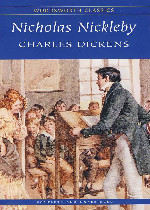
Nicholas Nickleby(尼古拉斯·尼克贝) 立即阅读
Nicholas Nickleby; or, The Life and Adventures of Nicholas Nickleby is Charles Dickens's third published novel. He returned to his favourite publishers and to the format that was considered so successful with The Pickwick Papers. The story first appeared in monthly parts, after which it was issued in one volume. The style is considered to be episodic and humorous, though the second half of the novel becomes more serious and tightly plotted. Dickens began writing Nickleby while still working on Oliver Twist and while the mood is considerably lighter, his depiction of the Yorkshire school run by Wackford Squeers is as moving and influential as those of the workhouse and criminal underclass in Twist.
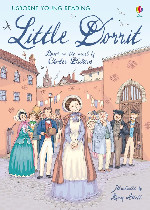
Little Dorrit is a novel by Charles Dickens, originally published in serial form between 1855 and 1857. The story features Amy Dorrit, youngest child of her family, born and raised in the Marshalsea prison for debtors in London. Arthur Clennam encounters her after returning home from a 20-year absence, ready to begin his life anew. The novel satirises the shortcomings of both government and society, including the institution of debtors' prisons, where debtors were imprisoned, unable to work, until they repaid their debts. The prison in this case is the Marshalsea, where Dickens's own father had been imprisoned.
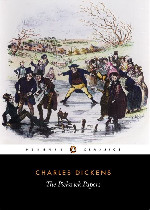
The Pickwick Papers(匹克威克外传) 立即阅读
The Posthumous Papers of the Pickwick Club (also known as The Pickwick Papers) was Charles Dickens's first novel. He was asked to contribute to the project as an up-and-coming writer following the success of Sketches by Boz, published in 1836 (most of Dickens' novels were issued in shilling instalments before being published as complete volumes). Dickens (still writing under the pseudonym of Boz) increasingly took over the unsuccessful monthly publication after the original illustrator Robert Seymour had committed suicide.
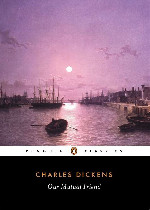
Our Mutual Friend(我们共同的朋友) 立即阅读
Our Mutual Friend, written in the years 1864–65, is the last novel completed by Charles Dickens and is one of his most sophisticated works, combining savage satire with social analysis. It centres on, in the words of critic J. Hillis Miller, quoting from the character Bella Wilfer in the book, "money, money, money, and what money can make of life." Most reviewers in the 1860s continued to praise Dickens' skill as a writer in general, though not reviewing this novel in detail. Some found the plot too complex, and not well laid out. The Times of London found the first few chapters did not draw the reader into the characters.
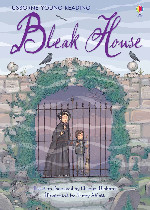
Bleak House is a novel by English author Charles Dickens, first published as a serial between March 1852 and September 1853. The novel has many characters and several sub-plots, and the story is told partly by the novel's heroine, Esther Summerson, and partly by an omniscient narrator. At the centre of Bleak House is a long-running legal case, Jarndyce and Jarndyce, which came about because someone wrote several conflicting wills. Dickens uses this case to satirise the English judicial system. Though the legal profession criticised Dickens' satire as exaggerated, this novel helped support a judicial reform movement, which culminated in the enactment of legal reform in the 1870s.
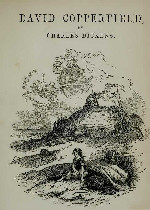
David Copperfield(大卫·科波菲尔) 立即阅读
David Copperfield is the eighth novel by Charles Dickens. The novel's full title is The Personal History, Adventures, Experience and Observation of David Copperfield the Younger of Blunderstone Rookery (Which He Never Meant to Publish on Any Account). It was first published as a serial in 1849–50, and as a book in 1850. The novel features the character David Copperfield, and is written in the first person, as a description of his life until middle age, with his own adventures and the numerous friends and enemies he meets along his way. It is his journey from being an impoverished, neglected child to a successful author.
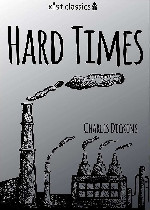
Hard Times is unusual in several ways. It is by far the shortest of Dickens' novels, barely a quarter of the length of those written immediately before and after it. Also, unlike all but one of his other novels, Hard Times has neither a preface nor illustrations. Moreover, it is his only novel not to have scenes set in London. Instead the story is set in the fictitious Victorian industrial Coketown, a generic Northern English mill-town, in some ways similar to Manchester, though smaller. Coketown may be partially based on 19th-century Preston.
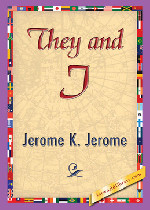
“It is not a large house,” I said. “We don’t want a large house. Two spare bedrooms, and the little three-cornered place you see marked there on the plan, next to the bathroom, and which will just do for a bachelor, will be all we shall require—at all events, for the present. Later on, if I ever get rich, we can throw out a wing. The kitchen I shall have to break to your mother gently. Whatever the original architect could have been thinking of—” “Never mind the kitchen,” said Dick: “what about the billiard-room?”
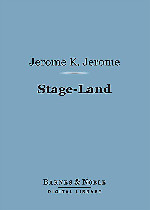
His name is George, generally speaking. "Call me George!" he says to the heroine. She calls him George (in a very low voice, because she is so young and timid). Then he is happy. The stage hero never has any work to do. He is always hanging about and getting into trouble. His chief aim in life is to be accused of crimes he has never committed, and if he can muddle things up with a corpse in some complicated way so as to get himself reasonably mistaken for the murderer, he feels his day has not been wasted.
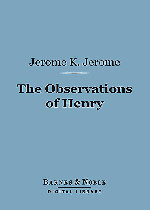
The Observations of Henry(亨利的观察) 立即阅读
The Observations of Henry is a delightful anthology of short stories. Some are witty. Some are downright humorous. Others have a touch of appealing pathos. And yet others just stir the imagination towards thinking of the more romantic side of life in 19th century Britain. The stories are cleverly linked as chapters from the reminiscences of a waiter who is analogous to the good old English butler. This is bedtime reading at its best.